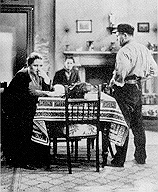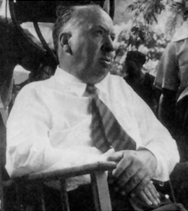FILM NOTES
FILM NOTES INDEX
NYS WRITERS INSTITUTE
HOME PAGE

(British, 1930, 85 minutes, b&w, DVD)
Directed by Alfred Hitchcock
Cast:
Sara Allgood . . . . . . . . . . Juno Boyle
Edward Chapman . . . . . . . . . . Capt. John "Paycock" Boyle
Marie O'Neill . . . . . . . . . . Mrs. Madigan
Sydney Morgan . . . . . . . . . .Joxer Daly
Kathleen O'Regan . . . . . . . . . . Mary Boyle
The
following film notes were prepared for the New York State Writers
Institute by Kevin Jack Hagopian, Senior Lecturer in Media Studies
at Pennsylvania State University:
The long shadow of the Troubles hangs over Sean O’Casey’s play, Juno and the Paycock. For Alfred Hitchcock, the film was begun under an even more intimidating shadow—that of the microphone.
 In making JUNO AND THE PAYCOCK, Hitchcock was fighting the novelty and primitiveness of sound, which had just come to the English screen. Hitchcock had just completed BLACKMAIL, British cinema’s very first sound film. BLACKMAIL had startled and delighted critics, with its unusually mature relations between sound and image, but when Hitchcock was asked to tackle the work of one of the country’s most respected dramatists, he paused. JUNO AND THE PAYCOCK’s long speeches troubled him, for he had no conceptual framework to understand how he might shoot them. Then, too, there was the question of his burgeoning ego. As Britain’s most talked-about young director, heavily promoted by his studio, British International Pictures, how could the same set accommodate Hitchcock and an illustrious scenarist? The result pleased critics almost as much as BLACKMAIL had, but, until the end of his life, Hitchcock thought the film overrated; critic James Agate called the film "very nearly a masterpiece," while Hitchcock said he felt as if he had "stolen" the film’s high reputation. He believed his version of the O’Casey play was too stage-bound, too static. Perhaps it was only the baroque Hitchcock temperament, which was bound to earth by the presence of the illustrious O’Casey and his Abbey Theatre troupe of players. For his part, O’Casey didn’t seem to have detected Hitchcock’s private struggle. O’Casey assisted Hitchcock with additional dialogue, and heartily approved of Hitchcock’s translation of his work to the screen. He even proposed another collaboration with Hitchcock, a project which eventually became O’Casey’s play, Within the Gates. What resulted from their work on JUNO AND THE PAYCOCK, we can now see, was a sure-handed adaptation of a major work of modern drama to the fledgling sound cinema.
In making JUNO AND THE PAYCOCK, Hitchcock was fighting the novelty and primitiveness of sound, which had just come to the English screen. Hitchcock had just completed BLACKMAIL, British cinema’s very first sound film. BLACKMAIL had startled and delighted critics, with its unusually mature relations between sound and image, but when Hitchcock was asked to tackle the work of one of the country’s most respected dramatists, he paused. JUNO AND THE PAYCOCK’s long speeches troubled him, for he had no conceptual framework to understand how he might shoot them. Then, too, there was the question of his burgeoning ego. As Britain’s most talked-about young director, heavily promoted by his studio, British International Pictures, how could the same set accommodate Hitchcock and an illustrious scenarist? The result pleased critics almost as much as BLACKMAIL had, but, until the end of his life, Hitchcock thought the film overrated; critic James Agate called the film "very nearly a masterpiece," while Hitchcock said he felt as if he had "stolen" the film’s high reputation. He believed his version of the O’Casey play was too stage-bound, too static. Perhaps it was only the baroque Hitchcock temperament, which was bound to earth by the presence of the illustrious O’Casey and his Abbey Theatre troupe of players. For his part, O’Casey didn’t seem to have detected Hitchcock’s private struggle. O’Casey assisted Hitchcock with additional dialogue, and heartily approved of Hitchcock’s translation of his work to the screen. He even proposed another collaboration with Hitchcock, a project which eventually became O’Casey’s play, Within the Gates. What resulted from their work on JUNO AND THE PAYCOCK, we can now see, was a sure-handed adaptation of a major work of modern drama to the fledgling sound cinema.
JUNO AND THE PAYCOCK is the story of the long suffering "Juno Boyle’s" (Sara Allgood) sudden good fortune at her family’s impending inheritance, and her dismay as her troubled family is slowly unwound by the prospect of great wealth. Juno’s boastful, spendthrift husband, "Paycock" (Edward Chapman) and his drinking buddy "Joxer Daly" (Sidney Morgan) bedevil her with their noisome, selfish ways. Her son "Johnny," having informed on a fellow IRA man, is pursued by a merciless rebel court, and her daughter "Mary," is dangerously in love with the lawyer who brings the news about the windfall. Through the storms the money brings, the battered, grieving Juno must remain the family’s rudder.
Hitchcock would use the experiences of JUNO AND THE PAYCOCK to fit himself for later stories of personal mystery and suspense woven through a larger tapestry of a nation in the balance. The film begins with an addition to O’Casey’s play, a speech by Barry Fitzgerald in which he extols Irish unity during the Rebellion. "When we have thought together and fought together, we have always won," goes the lyrical passage, as the tortured Boyle family’s saga is interwoven with the bleeding of Ireland during the Troubles. While critics have rightly criticized the film for its intrusive Jewish stereotyping, and its reduction of the play’s Mary into a less assertive, intelligent woman than O’Casey had designed, it is equally obvious that Hitchcock’s sense of humor enlivens the Paycock’s character considerably.
The interwar game of armed European espionage that bats a helpless Richard Hannay about like a shuttlecock in THE 39 STEPS; the war on the American World War II home front of SABOTEUR, and the cruel way it puts a man, falsely accused of sabotage, on the run for his life; the Cold War of NORTH BY NORTHWEST that makes a pawn of Roger Thornhill—all these are previewed in the way the Boyle family, eccentric, tragic, and endearing, are swept up in the political events of a world they never made. They are at war with themselves as their lovely wounded has been at war with England. They are their nation’s own weeping, divided heart.
— Kevin Hagopian, Penn State University
For additional information, contact the Writers Institute at 518-442-5620 or online at https://www.albany.edu/writers-inst.
 Juno and the Paycock
Juno and the Paycock